

- Home
- Companies
- MedChemExpress LLC (MCE)
- Products
- MedChemExpress - Model Rutaecarpine - ...
MedChemExpress - Model Rutaecarpine - 84-26-4
Rutaecarpine, an alkaloid of Evodia rutaecarpa, is an inhibitor of COX-2 with an IC50 value of 0.28 μM.MCE products for research use only. We do not sell to patients.
Rutaecarpine
MCE China:Rutaecarpine
Brand:MedChemExpress (MCE)
Cat. No.HY-N0147
CAS:84-26-4
Synonyms:Rutecarpine
Purity:99.09%
Storage:Please store the product under the recommended conditions in the Certificate of Analysis.
Shipping:Room temperature in continental US; may vary elsewhere.
Description:Rutaecarpine, an alkaloid of Evodia rutaecarpa, is an inhibitor of COX-2 with an IC50 value of 0.28 μM.
In Vitro:Rutaecarpine has shown a variety of intriguing biological properties such as anti-thrombotic, anticancer, anti-inflammatory and analgesic, anti-obesity and thermoregulatory, vasorelaxing activity, as well as effects on the cardiovascular and endocrine systems[2]. Rutaecarpine inhibits COX-2 and COX-1 dependent phases of PGD2 generation in BMMC in a concentration-dependent manner with an IC50 of 0.28 μM and 8.7 μM, respectively. It inhibits COX-2-dependent conversion of exogenous arachidonic acid to PGE2 in a dose-dependent manner by the COX-2-transfected HEK293 cells[1].
In Vivo:Rutaecarpine showed in vivo anti-inflammatory activity on rat l-carrageenan induced paw edema by intraperitoneal administration[1]. Rutaecarpine significantly decreases the number of antibody-forming cells and causes weight decrease in spleen in a dose-dependent manner. In addition, rutaecarpine administered mice exhibit reduced splenic cellularity, decreased numbers of total T cells, CD4+ cells, CD8+ cells, and B cells in spleen. IL-2, interferon and IL-10 mRNA expressions are suppressed significantly by rutaecarpine treatment. The number of CD4+IL-2+ cells is reduced significantly following administration of mice with rutaecarpine[3].
Animal Administration:Rats: Rutaecarpine is dissolved in 0.1% carboxymethyl cellulose and diluted with appropriate medium before use. Male Splague-Dawley (SD) rats (180-220 g) are used in the study. Rutaecarpine administered intraperitoneally and, 1 h later, l-carrageenan solution is injected to right hind paw of rats. Paw volumes are measured using plethysmometer 5 h after l-carrageenan injection[1]. Mice: For the antibody response to SRBCs, rutaecarpine is administered at a single dose of 10 mg/kg, 20 mg/kg, 40 mg/kg or 80 mg/kg in 10 mL of 1% povidone solution intravenously. Control animals are given 1% povidone solution at 10 mL/kg. Specific pathogen-free female BALB/c mice are used in the study[3].
Cell Assay:Rutaecarpine is dissolved in DMSO and diluted with appropriate medium before use. COX-1 and COX-2 cDNA-transfected HEK293 cells are prepared. For measuring inhibitory activity on COX-1 and COX-2 by rutaecarpine, cells in 1 mL of culture medium are seeded into each well of 24-well. After culture for 4 days, the supernatants are removed and 250 mL of fresh medium is added to the cells with or without rutaecarpine. After preincubation for 5 h at 37°C, the cells are further incubated at 37°C for 30 min with 50 mM arachidonic acid. All reactions are stopped by centrifugation at 120 g at 4°C for 5 min. Concentrations of PGE2 in the supernatant are measured[1].
IC50 & Target:COX-2 0.28 μM (IC50, in BMMC) COX-1 8.7 μM (IC50, in BMMC)
Hot selling product:Leukotriene E4-d5 | PD158780 | Veratric acid | NVS-SM2 | PA-9 | Cy2 | Gossypol (acetic acid) | C-021 | Cichoriin | Purpurin
Trending products:Recombinant Proteins | Bioactive Screening Libraries | Natural Products | Fluorescent Dye | PROTAC | Isotope-Labeled Compounds | Oligonucleotides
References:
[1]. Moon TC, et al. A new class of COX-2 inhibitor, rutaecarpine from Evodia rutaecarpa. Inflamm Res. 1999 Dec;48(12):621-5. [Content Brief]
[2]. Lee SH, et al. Progress in the studies on rutaecarpine. Molecules. 2008 Feb 6;13(2):272-300. [Content Brief]
[3]. Jeon TW, et al. Immunosuppressive effects of rutaecarpine in female BALB/c mice. Toxicol Lett. 2006 Jul 1;164(2):155-66. [Content Brief]
Brand introduction:
• MCE (MedChemExpress) has a global exclusive compound library of more than 200 kinds, and we are committed to providing the most comprehensive range of high-quality small molecule active compounds for scientific research customers around the world;
• More than 50,000 highly selective inhibitors and agonists are involved in various popular signaling pathways and disease areas;
• The products cover a variety of recombinant proteins, peptides, commonly used kits, more PROTAC, ADC and other characteristic products, widely used in new drug research and development, life science and other scientific research projects;
• Provide virtual screening, ion channel screening, metabolomics analysis detection analysis, drug screening and other professional technical services;
• It has a professional experimental center and strict quality control and verification system;
• Provide LC/MS, NMR, HPLC, chiral analysis, elemental analysis and other quality inspection reports to ensure the high purity and high quality of products;
• The biological activity of the products has been verified by the experiments of customers in various countries;
• A variety of top journals such as Nature, Cell, Science and pharmaceutical patents have included the scientific research results of MCE customers;
• Our professional team tracks the latest pharmaceutical and life science research and provides you with the latest active compounds in the world;
• It has established long-term cooperation with the world's major pharmaceutical companies and well-known scientific research institutions。
